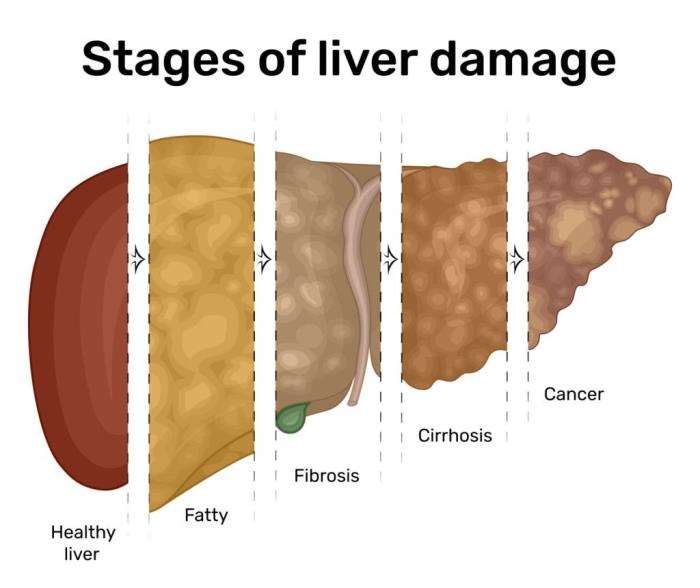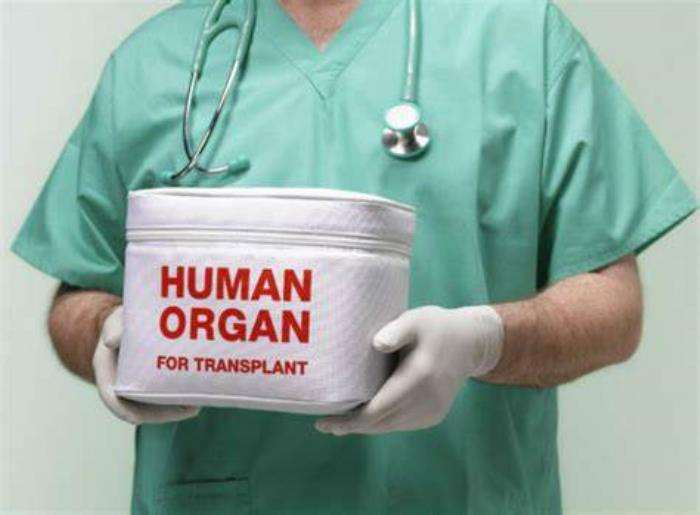Liver cirrhosis is the final stage of chronic liver disease, characterized by the progressive scarring of liver tissue. This scarring occurs as the liver tries to repair itself from long-term damage, affecting its ability to function properly. Over time, cirrhosis leads to liver failure, where the liver can no longer perform vital functions necessary for survival.
Medical disclaimer: This content is for general awareness and does not replace a doctor’s consultation. For diagnosis or treatment decisions, consult a qualified specialist.
Causes of Liver Cirrhosis: From Alcohol to Hepatitis
Liver cirrhosis can result from several causes, including chronic alcohol consumption, viral hepatitis (particularly hepatitis B and C), non-alcoholic fatty liver disease (NAFLD), and autoimmune liver diseases. Other factors, such as genetic conditions and long-term exposure to toxins, can also contribute to the development of cirrhosis.
The Stages of Liver Cirrhosis and Its Progression
Cirrhosis progresses through several stages, starting with mild liver inflammation (compensated cirrhosis), where the liver can still perform its functions. As the disease advances, liver function declines (decompensated cirrhosis), leading to severe complications such as jaundice, ascites, and variceal bleeding. The progression can be slow, but if untreated, cirrhosis eventually leads to liver failure.

Symptoms and Complications of Liver Cirrhosis
Common symptoms of cirrhosis include fatigue, abdominal pain, jaundice (yellowing of the skin and eyes), swelling in the legs or abdomen, and confusion. Complications include liver failure, internal bleeding, infections, kidney dysfunction, and hepatic encephalopathy, a condition that affects brain function due to liver failure.
How Liver Cirrhosis Affects Overall Health
Cirrhosis disrupts numerous bodily functions, leading to a weakened immune system, difficulty processing toxins, and poor blood clotting. As the liver becomes less effective, other organs, such as the kidneys and brain, may be impacted. Cirrhosis also increases the risk of developing liver cancer, further complicating the patient's overall health.
The Role of Liver Transplant in End-Stage Cirrhosis
Liver transplantation is the only definitive treatment for end-stage cirrhosis, where the liver is no longer able to maintain proper function. A liver transplant replaces the damaged organ with a healthy one, offering patients the chance for improved quality of life and extended survival. The procedure is typically recommended when other treatments can no longer control the symptoms or complications of cirrhosis.
When is Liver Transplantation Necessary for Cirrhosis Patients?
Liver transplantation is necessary when cirrhosis progresses to the point where the liver is severely damaged and cannot function adequately. This is typically indicated when the patient experiences complications such as ascites, variceal bleeding, or hepatic encephalopathy, or when liver function is critically impaired, and other treatments fail to manage the disease. The decision to proceed with a transplant depends on the patient's overall health, the severity of liver damage, and the likelihood of success after surgery.
The Eligibility Criteria for Liver Transplant in Cirrhosis Patients
Cirrhosis patients are considered for liver transplantation when their liver function is severely impaired, and they experience complications like portal hypertension, ascites, encephalopathy, or liver cancer. Key eligibility factors include the severity of liver damage (measured using MELD or Child-Pugh scores), the patient's overall health, and their ability to adhere to post-transplant care. In cases of alcohol-related cirrhosis, a period of sobriety (typically six months) is often required before listing for transplant.
How Liver Transplant Helps Restore Liver Function in Cirrhosis
Liver transplantation is the only treatment option that can restore normal liver function in patients with end-stage cirrhosis. By replacing the diseased liver with a healthy donor liver, the transplant alleviates symptoms like jaundice, ascites, and encephalopathy, while restoring the liver’s ability to process nutrients, filter toxins, and produce essential proteins.
The Importance of Timely Liver Transplantation for Cirrhosis Patients
Timely liver transplantation is crucial to preventing life-threatening complications of cirrhosis, such as liver failure, bleeding from varices, or hepatic encephalopathy. Delaying the transplant may reduce the chances of success and survival, as further damage to the liver increases the risk of complications and decreases the likelihood of recovery after transplantation.
Risks and Complications of Liver Transplant for Cirrhosis Patients
While liver transplantation offers a life-saving solution for cirrhosis, it carries risks, including organ rejection, infection, bleeding, and complications related to immunosuppressive medications (such as kidney dysfunction or increased cancer risk). The transplanted liver may also develop complications, like bile duct problems or graft dysfunction, particularly if cirrhosis was caused by viral hepatitis or alcohol.
Post-Transplant Care and Recovery for Cirrhosis Patients
Post-transplant care is vital to ensure successful recovery and avoid complications. This involves close monitoring for signs of organ rejection, managing immunosuppressive medications, maintaining a healthy diet, and regular follow-up appointments. Rehabilitation may include physical therapy, psychological support, and lifestyle modifications to help patients adjust to life after transplantation.

Managing Alcohol Abstinence for Liver Transplant Candidates
For patients with alcohol-related cirrhosis, abstinence from alcohol is a critical factor in both qualifying for a liver transplant and ensuring the long-term success of the transplant. Patients are typically required to demonstrate a period of sobriety (at least six months) before being considered for a transplant. Post-transplant, maintaining sobriety is essential for graft survival and overall health.
Impact of Cirrhosis on Liver Transplant Success Rates
Cirrhosis can affect liver transplant success rates depending on the underlying cause and the extent of liver damage. Patients with advanced cirrhosis or complications such as liver cancer may face higher risks during surgery and recovery. However, successful liver transplants in cirrhosis patients can significantly improve quality of life and survival rates when performed at appropriate times.
The Role of Medication and Lifestyle Changes in Cirrhosis Management
Medications are essential in managing cirrhosis and its complications, such as diuretics for fluid retention and beta-blockers to reduce the risk of variceal bleeding. Lifestyle changes, including a low-sodium diet, weight management, and avoiding alcohol, are also key to slowing disease progression and improving outcomes for patients awaiting liver transplant.
Prevention of Cirrhosis Progression: When to Seek Liver Transplant Evaluation
Early evaluation for liver transplantation is recommended when cirrhosis progresses to the point of decompensation, which may include symptoms like jaundice, variceal bleeding, ascites, or encephalopathy. If cirrhosis is diagnosed early, medications, lifestyle changes, and careful monitoring may help delay the need for transplant, but patients should be referred for transplant evaluation when their liver function deteriorates significantly.
Advances in Liver Transplantation for Cirrhosis Patients
Recent advances in liver transplantation for cirrhosis patients include improved organ preservation techniques, such as machine perfusion, and the use of expanded criteria donors. Minimally invasive surgical approaches are becoming more common, leading to shorter recovery times. Advances in immunosuppressive therapies aim to reduce side effects while maintaining graft health.
The Psychological and Social Aspects of Cirrhosis and Liver Transplant
Cirrhosis and the process of liver transplantation can take a significant psychological toll on patients. Depression, anxiety, and body image concerns may arise due to the illness and surgery. Additionally, patients may face social challenges, including stigma or financial strain. Psychological counseling, support groups, and family involvement are crucial to helping patients navigate these challenges and support their recovery.
Life After Liver Transplant for Cirrhosis Patients
Life after liver transplant can be transformative for cirrhosis patients, offering improved liver function and the potential for a return to normal daily activities. However, lifelong medication adherence, regular medical check-ups, and monitoring for complications are essential. Patients may also need to make long-term adjustments in lifestyle, diet, and exercise to maintain a healthy graft and avoid complications.
Innovations in Minimally Invasive Liver Transplant Techniques
Explore innovations in minimally invasive liver transplant techniques. Learn about groundbreaking advancements like robotic-assisted surgery and suture-free technologies that are transforming liver transplantation with reduced recovery times and surgical risks.
Long-Term Monitoring and Health Goals Post-Liver Transplant
Long-term monitoring after liver transplant involves regular blood tests, imaging, and liver function assessments. The goal is to detect early signs of rejection, infection, or other complications. Patients are also encouraged to set health goals related to maintaining a balanced diet, regular exercise, and mental well-being to ensure the success of the transplant and overall quality of life.
Best Liver Transplant in India
The Best Liver Transplant in India provides life-saving treatment for patients with end-stage liver disease, offering advanced surgical techniques and comprehensive post-transplant care for successful recovery.
Best Liver Transplant Hospitals in India
The Best Liver Transplant Hospitals in India are equipped with cutting-edge technology and expert medical teams, ensuring top-notch care and optimal recovery for liver transplant patients.
Liver Transplant Cost in India
The Liver Transplant Cost in India offers an affordable solution for patients needing liver transplantation, ensuring access to world-class care at competitive pricing.
Best Liver Transplant Surgeons in India
The Best Liver Transplant Surgeons in India are highly skilled in performing liver transplants, providing precise surgeries and personalized care to ensure the best possible outcomes for their patients.
FAQ Section
1. What are the main causes of liver cirrhosis?
The main causes of liver cirrhosis include chronic alcohol consumption, viral hepatitis (B and C), non-alcoholic fatty liver disease (NAFLD), autoimmune liver diseases, and certain genetic disorders.
2. How is liver cirrhosis diagnosed?
Liver cirrhosis is diagnosed through blood tests, imaging studies (such as ultrasound or CT scans), liver biopsy, and sometimes elastography, which measures liver stiffness. Symptoms such as jaundice, swelling, and confusion may also prompt further investigation.
3. What are the signs that cirrhosis has progressed to a point where a transplant is needed?
Signs that cirrhosis has progressed to the point where a liver transplant is needed include jaundice, severe fatigue, swelling of the abdomen or legs (ascites), confusion (hepatic encephalopathy), frequent infections, and bleeding from varices.
4. How does a liver transplant help patients with cirrhosis?
A liver transplant replaces the damaged liver with a healthy one, restoring essential liver functions such as detoxifying the blood, producing proteins, and metabolizing nutrients. This eliminates the symptoms of liver failure and significantly improves the patient's quality of life.
5. What are the risks of liver transplantation for cirrhosis patients?
The risks of liver transplantation for cirrhosis patients include organ rejection, infections, bleeding, complications from immunosuppressive medications (such as kidney dysfunction and increased cancer risk), and issues related to the transplanted liver such as bile duct complications or graft failure.
After a liver transplant, managing cardiovascular health is crucial for improving long-term outcomes and quality of life. Key strategies include regular cardiovascular monitoring, maintaining a heart-healthy diet, engaging in physical activity, managing blood pressure and cholesterol levels, and adhering to prescribed medications. Addressing risk factors such as obesity, diabetes, and smoking is also essential. Collaborative care involving cardiologists, transplant teams, and primary care providers ensures comprehensive management and early detection of cardiovascular issues. Managing Cardiovascular Health After a Liver Transplant
Regular check-ups after a liver transplant are essential for monitoring the health of the new liver and ensuring overall well-being. These appointments allow healthcare providers to detect any signs of rejection, infection, or complications early on. Routine blood tests, imaging studies, and sometimes liver biopsies are conducted to assess liver function and detect potential issues. Adhering to follow-up care schedules helps prevent serious complications, manage medication side effects, and make necessary adjustments to treatment plans, ultimately improving long-term outcomes and quality of life. The Importance of Regular Check-Ups Post Liver Transplant
After a liver transplant, bile duct complications can occur, including leaks, strictures, and infections. These issues are managed through various approaches, such as endoscopic retrograde cholangiography (ERC) with balloon dilation and stenting, percutaneous transhepatic cholangiography (PTC), and sometimes surgical interventions. Regular monitoring and early detection through blood tests and imaging studies are crucial for timely treatment and preventing serious complications. How Bile Duct Issues Are Managed After Liver Transplant Surgery